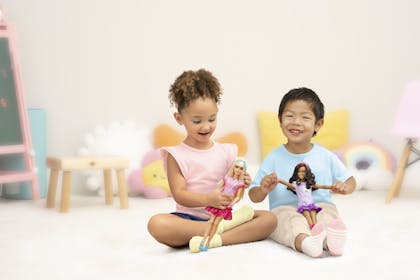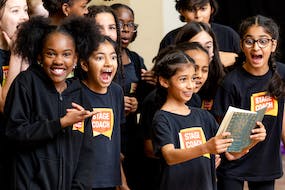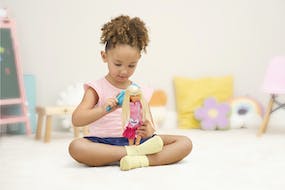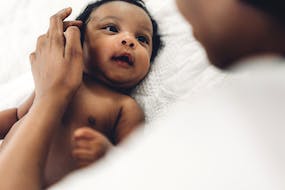6 surprising benefits of playing with dolls for preschoolers
Advertisement Promotion
Kids LOVE dolls, but they’re so much more than just something cute to play with. They can help your preschooler learn social skills, boost imaginative play and more. Here’s why dolls are the magic ingredient to help your little one learn through play.
Dolls tend to be one of the first toys we have (and love) as children. You may know how much your preschooler loves their favourite dolls. But do you know just how much playing with dolls benefits them too?
While they’re having hours of fun, they're also learning all sorts of things that will help them now and when they start school. No matter the gender of your child, dolls are a vital addition to your toy box. Here are just some of the benefits for preschool children of playing with dolls …
1. Dolls can boost your preschooler’s imagination
Children love make-believe, and playing with dolls is the ideal chance to let their imaginations go wild. They can decide who their doll is that day (a friend, a nursery teacher, a parent) and what exciting situation they are in. And for the first time, younger children can put their pretend play skills to the test with My First Barbie , an all-new Barbie doll designed specifically for preschoolers.
Slightly larger than the traditional Barbie and with a softer body, easy to manoeuvre arms and hook-and-loop closures on clothes, My First Barbie lets your child imagine any story they want.
2. It helps with fine motor skills
Playing with and dressing up dolls helps your preschooler with another key area of development: fine motor skills. These require the development of smaller muscles in their hands and fingers, and are crucial for activities like writing when they start school.
My First Barbie gives your preschooler the chance to practice these skills. A bit bigger than a traditional Barbie (13.5 inches compared to 11.5 inches) it has a body that's easier to pose, with accessories that are larger too. The closures on the clothes are simpler for little hands to navigate. This helps your preschooler develop essential fine motor skills, along with their hand-eye coordination as they brush My First Barbie’s hair or change her shoes.
3. It encourages independent play
From a trip to the beach to throwing them a tea party, your preschooler can become completely engrossed in organising activities with their doll. You may find they're able to play independently – on their own but with you close by and always within eyesight – for longer periods of time. The ability to play on their own is a key part of your preschooler's development, helps them with problem solving skills and grows their confidence: when they play with My First Barbie, they are in charge!
This opportunity for solo play was really important for the experts behind My First Barbie. Their research* found parents wanted their preschoolers to have a Barbie, but said they struggled to play independently with the doll.
With this in mind, the My First Barbie range includes lots of easy-to-play-with accessories that spark moments of independent play. There’s dress up fun a-plenty thanks to an amazing fashion pack with outfits for a birthday party, beach and bedtime.
For imaginary parties and sleepovers, My First Barbie Tea Party Playset comes with mini cakes and cute teddy chairs while the Bedtime Playset has a pull-out bed for friends to ‘stay over’.
*Based on My First Barbie Exploration findings with mums of preschoolers, conducted by Mattel Global Consumer Insights in December 2020.
4. Dolls can help your preschooler learn empathy
Hearing your preschooler chatting away to their dolls is so cute. It also helps them develop vital skills including empathy.
Neuroscientists from Cardiff University, working in partnership with Barbie *, carried out an 18-month study on boys and girls aged 4-8. And they found playing with a doll activates regions of a child’s brain associated with ‘social information processing’. This is basically the part of our brains we use when thinking about other people and their thoughts or feelings.
Educational psychologist Dr Michele Borba says:
‘Children who have developed empathy and social skills early in life can have better grades, stay in school longer and make healthier choices overall.
'Empathetic children might also be more likely to stand up for a child being bullied and try to engage and resolve the conflict. Understanding that kids can help develop these skills through playing with dolls like Barbie, is remarkable and a helpful tool for parents.’
*Study was commissioned by Barbie ™ (2020)
5. … and practice for real-life situations
Researchers also found that playing with dolls gives children the chance to copy actions they see their preschool teachers, parents and other adults do. And this helps prepare them for real-life situations when they’re older.
From giving their doll breakfast to 'taking' their doll to a doctor’s appointment to running an imaginary classroom, this doll play is hugely important in putting social skills into practice. (And can help prepare your child for the big step of starting school!).
Your child will also learn about personal care and daily routines with the large-scale accessories, such as the brush that lets your child comb and style My First Barbie’s hair.
6. It can help with language development
Joining in while your preschooler plays with their doll gives you a great opportunity to help boost their vocabulary. You can use descriptive words (‘Your doll has such long brown hair’ or ‘Look at her red shoes’) and give your child the words for what is in their game.
The range of My First Barbie accessories provides the opportunity to learn new words for concrete things like 'chair' and 'sun lounger' as well as more conceptual phrases like 'tea party'. Your preschooler will practice their language skills too as they chat to their doll. By the time they start school, they'll be happily chatting away!
My First Barbie is recommended for children aged 3+. Make sure you supervise your child time at all times while they're playing.
©2023 Mattel
Related content
5 signs of emotional intelligence in preschoolers







